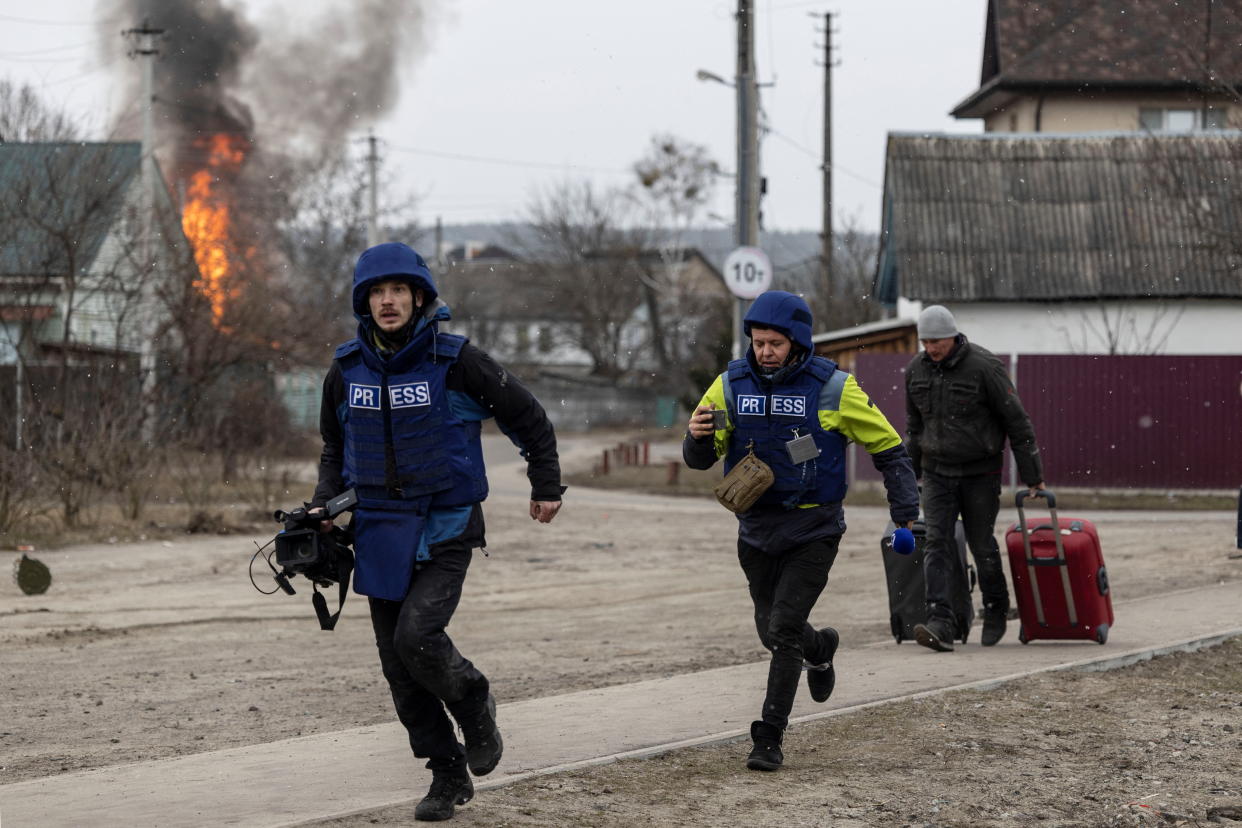Fighting back against Putin's war on the media
As the words and images from Ukraine grow grimmer and more heartbreaking by the hour, it’s almost impossible to imagine what Ukrainians are going through. To the extent we have any idea is thanks to reporters on the ground. And Putin is waging war on those brave souls as well — in Ukraine and in Russia. Putin isn’t only attacking journalists, but the very concept of journalism — and even truth itself.
Putin’s global war on the media is part of his M.O.: A dirty, sneaky and deadly affair served up with innuendo, lies, intimidation and ultimately murder. All this makes the work of professional reporters that much more difficult and dangerous and makes legitimate news organizations that much more valuable.
Three journalists were killed in Ukraine this week; producer Oleksandra "Sasha" Kuvshynova, Fox News cameraperson Pierre Zakrzewski and freelance journalist Brent Renaud. Fox News State Department correspondent Benjamin Hall was injured in the attack on Kuvshynova and Zakrzewski and is hospitalized. Earlier this month, Ukrainian cameraman Yevhenii Sakun was killed when Russian forces shelled a television tower in Kyiv, according to the Committee to Protect Journalists. CPJ also reports that journalists have been shot, shelled and robbed covering the war, and that Ukrainian reporter Oleh Baturyn has been missing since last Saturday.
Being a journalist in Ukraine has long been a deadly business. See this list of scores of journalists murdered there over the previous three decades. To be clear, the murderers come from many quarters including organized crime, allegedly pro-Russian groups and those with links to the pre-Zelenskyy Ukrainian government.

In Russia however, working as a reporter is akin to a death wish. Hundreds of reporters have been killed over the past 30 years. It’s why I’ve always resisted sending journalists to Russia. The better the work they do, the more likely it is they will be killed. No thanks.
(CPJ tracks the number of journalists murdered worldwide. In case you’re wondering, 12 journalists have been murdered in the U.S. since 1992 — none, it appears at the hands of the U.S. government.)
“The job has gotten more difficult and dangerous,” says Barbara Benitez-Curry, professor at George Washington University who formerly worked for CNN and Al Jazeera. “I don't think journalists should go to a protest even in America without support and a hostile situation training.”
Paradoxically, Russia has had a vibrant media scene as The New York Times points out: “For all the state’s control of media, people could read or watch what they wanted, including foreign newscasts like BBC and CNN. The internet was largely unfettered.” This had included significant independent media like Echo of Moscow radio and TV Rain. But not anymore. They were both shut down this month.
“Everything that’s not propaganda is being eliminated,” said journalist Dmitri A. Muratov, who shared the Nobel Peace Prize with Philippine journalist Maria Ressa last year. That extends to most social media too. Putin has shuttered Facebook and Instagram (the latter had 80 million users), Twitter is being throttled, TikTok limited and so on.

Earlier this month Putin rammed through a new law that essentially criminalizes any reporting that contradicts the government's version of events. Penalties include monetary fines and 15 years in jail. And of course hanging over the fines and jail is murder. Kremlin spokesman, Dmitry Peskov, said the law was a response to a campaign of “information terrorism” by the West, according to NPR.
Ah, information terrorism. In fact, that’s what Putin has been practicing against the West for years now. He’s weaponized social media: namely Facebook, Twitter and YouTube, through surreptitious posts and campaigns orchestrated by the FSB (successor to the KGB) through its troll farm, the Internet Research Agency (IRA), Black Lives Matter, Blue Lives Matter, pro- and anti-Trump and Biden, the IRA has manipulated all of these debates online — and much more too. The goal has been to sow anger and discontent and to weaken the United States. And to some degree it’s worked.
There’s Putin’s traditional media too, like RT, a Russian television network directed at audiences outside of Russia, which shut down in the U.S. this month after it was dropped by DirectTV and Roku, as documented in this excellent piece by Cecelia Kang of The New York Times. What a twisted tale!
The misinformation and disinformation foisted on us by Putin’s regime serves to undermine what real journalism is and what real journalists do. He wants us to question all media and for us to lump it together in a stew of uncertainty.
But of course there is real reporting and truth and it matters. Especially now. There's tremendous work being done by legacy news organizations like this incredible piece by The Wall Street Journal on Chernobyl. (How’d they get that?) Or this Reuters story syndicated by Yahoo News. Or the reporting by Clarissa Ward and Matthew Chance at CNN. Or this shocking piece from the AP. And more great coverage from the BBC and The Washington Post and on and on.
“There’s a lot of sport in beating the hell out of so-called mainstream news media,” says David Folkenflik, media correspondent at NPR. “When the stakes are elevated, people turn to news organizations that have a track record on issues of such gravity and it’s up to those journalists to honor that trust and hope they can sustain it.”
I thought about this when I was checking out the recent Morgan Stanley telecom, media and technology conference. There was the usual talk of crypto and NFTs, and telcos versus cable, but I was surprised to see that "institutional journalism is critical in times of global uncertainty," as a key takeaway. It’s not often you hear the Wall Street crowd talk about journalism.
I’m sure there are some awesome TikTok Influencers with great sourcing, insight and resources, but in times like this I’ll take the established, the vetted and the verified. Now the world has to ensure these news organizations and reporters aren’t being compromised, shut down — or murdered — by Putin.
This article was featured in a Saturday edition of the Morning Brief on March 19, 2022. Get the Morning Brief sent directly to your inbox every Monday to Friday by 6:30 a.m. ET. Subscribe
By Andy Serwer, editor-in-chief of Yahoo Finance. Follow him on Twitter: @serwer
Read the latest financial and business news from Yahoo Finance
Follow Yahoo Finance on Twitter, Facebook, Instagram, Flipboard, LinkedIn, and YouTube
